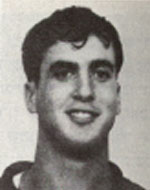Gazit, Nimrod
Nimrod, son of Ruth and Yitzhak, was born on the 12th of Adar 5714 (17.3.1954) in Haifa. He studied at the Be’eri Elementary School in Haifa and at the Ironi Gimel High School in Haifa, and then continued his studies at the military boarding school near the Hebrew Reali School in Haifa. Nimrod, nicknamed “Nimi”, was a good student and, according to his teacher, listened carefully to his lessons, although he did not take an active part in them. He was an avid tourist enthusiast, very fond of walking, knew the country well and toured all corners. Nimrod was silent, modest, and self-conscious. With great humility, when he spoke in praise, he was withdrawn and not many knew his rich soul well. Nimrod was simple in his manner, a serious lad with a strong mental strength. He was always responsible and ready to take every effort to fulfill his duty in full. Whatever he did – try to do well, efficiently and meticulously. He was a loyal friend without any manners or arithmetic; He could laugh and be cheerful, and all his acquaintances loved and admired him. Nimrod was strong-bodied, with an upright stature. Good green eyes and a shy, shy smile. In the framework of the military boarding school he completed a parachuting course and completed his studies at the boarding school as an outstanding trainee. The boarding school commander noted him as a quiet, responsible, self-confident, dedicated and intelligent man with a very good leadership capacity. In the summer of 1972, before he was drafted into the army, Nimrod made a one-month trip to Europe. And decided to study geography at the university after he finished his army service. Nimrod was drafted into the IDF at the beginning of November 1972 and was assigned to the Armored Corps, where he completed a course in the Patton tank, In the course of the Yom Kippur War, Nimrod was close to the end of the Armored Corps course and was assigned to an armored unit in Sinai, and three other cadets, among his good friends who had finished boarding school with him, organized a tank crew and fought in the battles of the Suez Canal. The four of whom had been trained as tank commanders, alternated in their positions in the tank, and commanded him alternately. The fighting destroyed several enemy tanks on the night of the breakout, October 16, 1973. In the battles of the Chinese farm on the Tartar axis, their tank was hit by a missile fired by the Egyptians and all of its crew fell. “His actions showed a spirit of volunteerism, courage and dedication to the mission,” he was quoted as saying in a citation given to him after his death by the chief of staff. Nimrod was brought back from Egypt only nine months later and was brought to rest in the military cemetery in Haifa.
